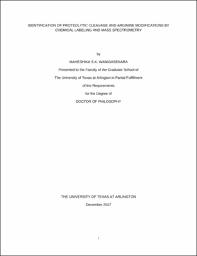
ATTENTION: The works hosted here are being migrated to a new repository that will consolidate resources, improve discoverability, and better show UTA's research impact on the global community. We will update authors as the migration progresses. Please see MavMatrix for more information.
Show simple item record
| dc.contributor.advisor | Chowdhury, Saiful M. | |
| dc.creator | Wanigasekara, Maheshika S.K. | |
| dc.date.accessioned | 2020-01-14T23:46:00Z | |
| dc.date.available | 2020-01-14T23:46:00Z | |
| dc.date.created | 2017-12 | |
| dc.date.issued | 2017-12-06 | |
| dc.date.submitted | December 2017 | |
| dc.identifier.uri | http://hdl.handle.net/10106/28905 | |
| dc.description.abstract | Post-translational modification of proteins plays a significant role in the regulation of cellular processes. During the translation, process proteins undergo different modifications, which are known as post-translational modifications (PTMs). Due to their low abundances, PTM analysis presents several challenges; therefore, efficient and sensitive PTM detection methods are required. Arginine is an essential amino acid in a cell, which undergoes several kinds of PTMs. Finding these functional arginine residues in a protein is a challenging task. The task was successfully addressed, and the findings are not only reported herein, but an assessment was recently reported covering the new chemical labeling methods developed for identifying functional arginine residues of proteins by comparing two widely used arginine labeling reagents—1,2-cyclohexanedione (CHD) and phenylglyoxal (PG). This dissertation combined the author’s and her research team’s previous studies with bio-orthogonal chemistry and quantitative mass spectrometry-based proteomics to develop a new approach for the selective enrichment of reactive arginine residues in proteins in complex samples. The primary achievement was the development of a novel arginine-specific, azide-tagged CHD analog, which enables labeling of reactive arginine residues for further studies. For large-scale samples, the workflow from this labeling process is adaptable for gel-based pre-separation. This research established a promising strategy for the effective profiling of reactive arginine residues in large-scale studies. N-terminal modifications of proteins can interpret the functions and stability of proteins, affecting their expression, activation, or degradation. Moreover, selective enrichment of N-terminal peptides from a complex mixture is a difficult challenge in the proteomics field. Currently we are working with two novel reagents, which have innovative properties to enrich the N-terminal peptides and to generate marker ions from the N-term-labeled peptides during tandem mass spectrometry. These studies will significantly contribute to proteomics and to further research in the bio-analytical mass spectrometry field. | |
| dc.format.mimetype | application/pdf | |
| dc.language.iso | en_US | |
| dc.subject | Proteomics | |
| dc.subject | Mass spectrometry | |
| dc.title | IDENTIFICATION OF PROTEOLYTIC CLEAVAGE AND ARGININE MODIFICATIONS BY CHEMICAL LABELING AND MASS SPECTROMETRY | |
| dc.type | Thesis | |
| dc.degree.department | Chemistry and Biochemistry | |
| dc.degree.name | Doctor of Philosophy in Chemistry | |
| dc.date.updated | 2020-01-14T23:48:11Z | |
| thesis.degree.department | Chemistry and Biochemistry | |
| thesis.degree.grantor | The University of Texas at Arlington | |
| thesis.degree.level | Doctoral | |
| thesis.degree.name | Doctor of Philosophy in Chemistry | |
| dc.type.material | text | |
| dc.creator.orcid | 0000-0002-2054-7279 | |
Files in this item
- Name:
- WANIGASEKARA-DISSERTATION-2017.pdf
- Size:
- 2.584Mb
- Format:
- PDF
This item appears in the following Collection(s)
Show simple item record


